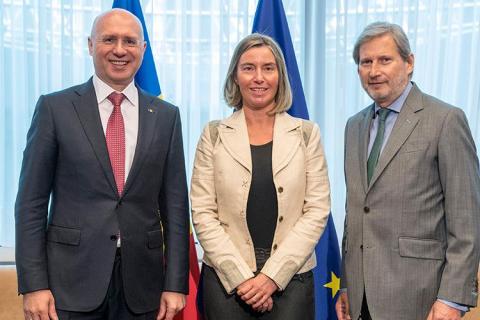
EU High Representative Federica Mogherini met Moldovan Prime Minister Pavel Filip in Brussels on 3 May on the occasion of the fourth Association Council meeting between the EU and the Republic of Moldova. With trade between the EU and Moldova up a further 18% in 2017, accounting for 55% of Moldova's total trade, the two sides discussed further steps to translate increased trade volumes into tangible benefits for citizens.
Discussions focused on reform efforts in Moldova and, while acknowledging the reform steps already taken, they underlined the importance of sustained and full implementation.
In the joint statement issued on the occasion, both parties underlined and welcomed the significant increase in trade volumes, in particular of Moldovan exports to the EU market. Future cooperation will focus on effective and timely implementation of the Deep and Comprehensive Free Trade Area (DCFTA), including by strengthening the operational capacity and independence of relevant institutions.
The EU and Moldova agreed on the scope for progress in a number of sectors, including sanitary and phytosanitary measures, the need to improve market conditions in the fields of energy and public procurement, as well as streamlining access to finance for SMEs.
All these steps are necessary in order to ensure the direct beneficiaries of intensified trade are ultimately the citizens of Moldova. Data for the first half of 2018 confirms the positive trend of growth in Moldovan exports to the EU, in particular for a number of products such as sunflower seeds, grapes, cereals, essential oils, footwear, carpets, glassware or machinery.
In 2017, total bilateral trade between the EU and Moldova increased by 18% to €4 billion. The European Union's imports from Moldova reached €1.6 billion in value, 23% more compared to 2016. The EU is Moldova's leading trading partner and the first investor in the country, accounting for over 55% of total trade.
Through its EU4Business initiative, the EU funds a series of programmes to improve access to finance, helping SMEs move into foreign markets and providing training to build up business skills. In addition, specific technical help is available to Moldovan SMEs to make sure they can make the most of the country’s free trade agreement with the EU.
